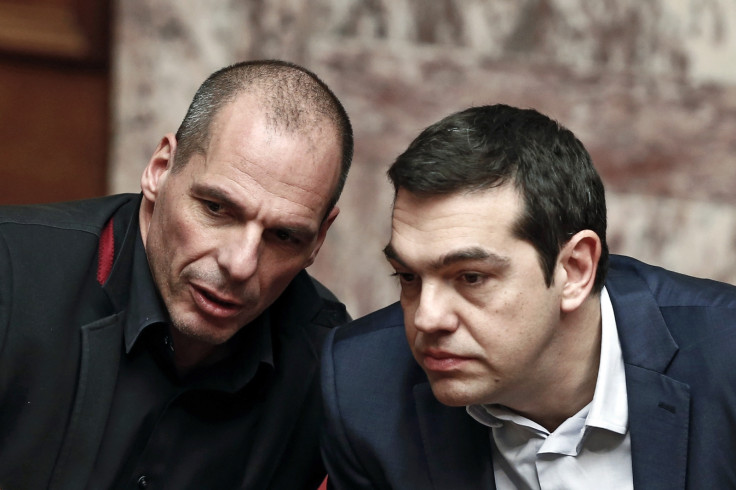Greece-EU crisis: Take it or leave it time approaches as Tsipras accuses creditors of pillaging

Greek Prime Minister Alexis Tsipras has accused creditors of "pillaging" his country for the past five years as EU leaders have started making plans for a "state of emergency."
His comments, to an Athens daily, came as talks between Athens and the creditors over a cash-for-reform deal came to a crashing halt on 14 June.
Without a cash-for-reforms deal with the EU and the International Monetary Fund, Greece is expected to default on a €1.5bn (£1.1bn; $1.7bn) debt repayment to the IMF due by the end of June 2015.
Athens's bailout deal with the EU also runs out on 30 June and Tsipras has been trying to unlock the final €7.2bn instalment.
The creditors are demanding that Greece cut pension payments to civil servant, slash the number of public sector worker and raise VAT.
Speaking to Greek newspaper Efimerida ton Syntakton, Tsipras warned: "Further cuts to pensions after five years of pillaging under the bailouts can only be viewed as serving political expediency.
I rule out a 'Grexit' as a sensible solution. But no one can rule out everything. I can't even rule out a comet hitting Earth
"We will patiently wait until creditors turn to realism. We have no right to bury the European democracy in the land where it was born. It is not a matter of ideological stubbornness. It has to do with democracy."
Greek Finance Minister Yanis Varoufakis told German's Bild newspaper: "I rule out a 'Grexit' as a sensible solution. But no one can rule out everything. I can't even rule out a comet hitting Earth."
"We have largely exhausted our limits," spokesman Gabriel Sakellaridis said. Tsipras' office said Greece was ready to restart talks at any time and was waiting for a signal from lenders which could loosen the deadlock. "If they call us with something new, we may also provide something new," one official said.
But Germany and other creditors displayed growing anger and impatience with Greece.
We will patiently wait until creditors turn to realism. We have no right to bury the European democracy in the land where it was born
"It won't work that Greece sets the terms and says 'everyone has to dance to our tune'. Greece needs to get back to reality," Volker Kauder, of Chancellor Angela Merkel's Christian Democrats, told ARD television.
Belgian Finance Minister Johan Van Overtveldt said the eurozone's credibility would be damaged and radical forces in other countries emboldened if past accords with Greece were changed.
The European Commission said it would only resume mediation efforts if Greece put forward new proposals, while the Greek government spokesman said Athens was sticking to its rejection of wage and pension cuts and higher taxes on basic goods.
Take it or leave time is approaching rapidly
EU officials said that without improved Greek proposals by 18 June, the Eurogroup session of heads of government would be very tough and was likely to present Greece with an ultimatum.
"No more new proposals; take it or leave it time is upon us, I think. Or very close." one eurozone official said.
German EU commissioner Guenther Oettinger said: "We should work out an emergency plan because Greece would fall into a state of emergency. Energy supplies, pay for police officials, medical supplies, and pharmaceutical products and much more" needed to be ensured.
This message is for Greece: it should not wait and should restart discussions with the institutions. Let's not waste time. Let's restart talks as quickly as possible
European Central Bank President Mario Draghi said: "While all actors will now need to go the extra mile, the ball lies squarely in the camp of the Greek government to take the necessary steps."
François Hollande, the French President, pleaded for talks to begin again before a key European Central Bank meeting on 17 June and a gathering of eurozone finance ministers the following day.
"We now have extremely tight deadlines," he said. "We are getting into a period which could be turbulent if no agreement is found. This message is for Greece: it should not wait and should restart discussions with the institutions. Let's not waste time. Let's restart talks as quickly as possible."
© Copyright IBTimes 2025. All rights reserved.





















